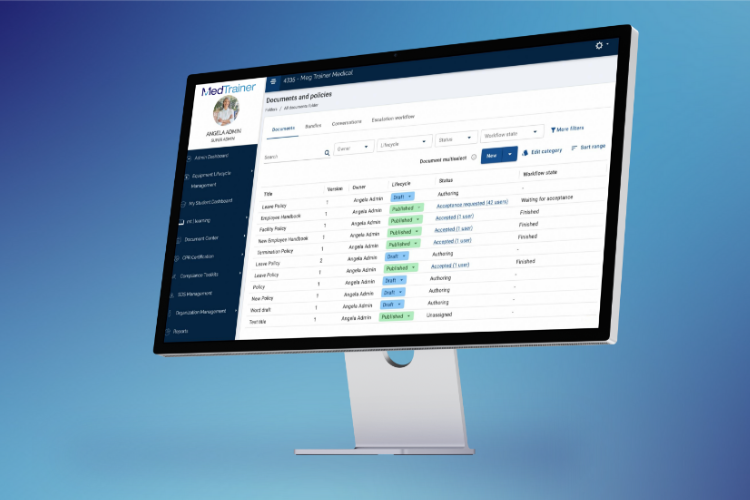Maintaining a high standard of compliance is paramount in the healthcare industry. The intricate web of regulations, laws, and ethical considerations can be overwhelming, making it essential for both healthcare organizations and individuals to stay current and knowledgeable — one way to achieve this is through medical compliance certification.
Medical compliance certification can bolster your organization’s reputation and ensure that you provide the highest level of care available. Medical compliance certification can assure patients, certification boards, and other organizations of your competence and commitment to excellence.
What Is Medical Compliance Certification?
At its core, medical compliance certification is a formal recognition that an individual or organization possesses an in-depth understanding of the intricate web of compliance principles, regulations, and best practices that govern the healthcare industry. This goes beyond a mere familiarity with rule — it demonstrates a comprehensive grasp of the nuances and evolving nature of compliance within the healthcare industry.
When an individual or organization pursues medical compliance certification, it underscores their commitment to ethical conduct and patient-centered care. Adherence to regulations isn’t just a legal obligation. It’s also an ethical imperative that directly impacts patient safety, privacy, and overall well-being. By seeking certification, healthcare entities and professionals signal their dedication to putting patients first.
Because patient trust and confidence are crucial to any healthcare organization, medical compliance certification serves as assurance. Patients and stakeholders alike are reassured knowing that the healthcare professionals and institutions they engage with have undergone rigorous training and assessments to ensure compliance — and remain committed to education, adaptation, and continuous learning.
Organizational Compliance Certification vs. Individual Compliance Certification
There are two different types of medical compliance certification: organizational and individual. Here’s the difference between the two:
- Organizational compliance certification: This type of certification is granted to healthcare organizations, clinics, hospitals, and other medical institutions that meet specific compliance standards and requirements. Organizational certifications often involve rigorous assessments, audits, and evaluations to ensure that the institution’s policies, procedures, and practices align with industry regulations. Examples of organizational certifications include HIPAA Compliance Certification and accreditation by recognized bodies such as The Joint Commission.
- Individual compliance certification: Individuals working within the healthcare industry can pursue certifications that validate their expertise in compliance-related matters. These certifications showcase their dedication to understanding and implementing regulations effectively. Examples of individual compliance certifications include the Certified in Healthcare Compliance (CHC) credential and Certified Compliance and Ethics Professional (CCEP) designation offered by the Compliance Certification Board (CCB).
Typically, it’s beneficial for healthcare organizations to provide both organizational and individual compliance training. Not only does it help individuals develop professionally, but it also improves the organization’s professional reputation.
Is Medical Compliance Certification Required?
Medical compliance certification is not mandated by law as a blanket requirement for all healthcare professionals or organizations. The healthcare landscape is diverse and multifaceted, encompassing a wide range of specialties, roles, and settings. As such, the necessity for medical compliance certification can vary based on factors such as the specific field of practice, the regulatory environment, and the organization’s policies.
However, despite the lack of universal mandate, there are compelling reasons why many healthcare professionals and organizations choose to pursue medical compliance certification.
Benefits of a Medical Compliance Certification for Your Organization
Should you invest in medical compliance certifications for your organization? Here are some of the benefits you can expect:
- Enhanced regulatory compliance: Healthcare compliance certifications provide a structured framework for organizations to adhere to regulations, laws, and standards. Achieving compliance ensures that patient information is protected, safety protocols are in place, and ethical practices are maintained. Compliance certifications guide organizations through the complexities of regulatory requirements, reducing the risk of costly violations.
- Improved patient care: Compliance isn’t just about ticking boxes; it directly impacts patient care. Certifications emphasize patient rights, data security, and safety measures. When healthcare professionals follow compliant practices, patients receive better care, their personal information remains confidential, and their overall experience is enhanced.
- Reduced risk: The healthcare landscape is fraught with legal and financial risks. Compliance certifications help mitigate these risks by instilling a culture of accountability and diligence. Organizations that achieve and maintain compliance certifications are better equipped to identify and address potential risks, reducing the likelihood of legal disputes and financial penalties.
- Increased efficiency: With standardized practices and protocols, healthcare organizations can streamline their operations. Compliance certifications often come with predefined processes that improve efficiency and reduce redundancies. Efficient workflows result in improved patient care delivery, reduced administrative burdens, and optimized resource allocation.
- Stronger reputation: A certified healthcare organization or individual enjoys a reputation of trustworthiness and reliability. Patients, partners, and stakeholders view compliance certifications as a mark of dedication to ethical conduct and quality care. A strong reputation attracts patients and establishes the organization as a leader in the industry.
- Commitment to continuing improvement: The pursuit of compliance certifications necessitates ongoing education and adaptation to evolving regulations. This commitment to continuous improvement is a cornerstone of healthcare excellence. Organizations that prioritize compliance certifications demonstrate their dedication to staying ahead of industry changes and challenges.
Medical compliance certifications aren’t mere badges — they are reflections of an organization’s dedication to patient care, ethical conduct, and regulatory adherence. Because healthcare demands unwavering dedication to compliance, these certifications pave the way for better patient outcomes, reduced risks, and a reputation that inspires confidence in patients and stakeholders alike.
Discover MedTrainer’s Compliance Certification Resources
At MedTrainer, we understand the significance of compliance certifications in healthcare. Our comprehensive platform offers a range of courses and resources designed to help healthcare professionals and organizations navigate the complexities of compliance. From HIPAA to OSHA and beyond, our solutions empower you to achieve and maintain compliance certifications that strengthen patient care, bolster your organization’s reputation, and ensure operational excellence.

